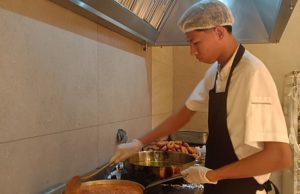September is Heritage Month, a time South Africans pause to honor what we’ve built, what we’ve lost, and what we choose to pass on. In Musina, on the northern edge of Limpopo, we’re doing something practical with that idea of heritage: repurposing a once-busy hotel into a fully residential training campus so that young people can inherit something far more valuable than a building: skills, dignity and a bridge into work.
At the heart of this effort is Stanley Marara, LVC’s inaugural Program Director. Stanley is the kind of leader who translates compassion into systems. With years in education and public service, he keeps our program focused on outcomes that matter accredited vocational training, life skills and wellness, and true work readiness. As he puts it, “This is more than a job. It’s a mission to restore dignity through opportunity.”
Why Limpopo, why now?
Limpopo is young, rural, and determined but the economic odds are real. The province has the lowest average annual household income in the country (about R128,309 in 2023), underscoring limited household resources to support studies, transport, and job searches. Statistics South Africa
Across South Africa, youth unemployment remains stubbornly high. In Q1 2025, the national youth unemployment rate rose to 46.1% (ages 15–34). That’s not just a number; it’s a signal that first jobs are too scarce, and the transitions from school to work remain fragile. Statistics South AfricaGovernment of South Africa. The official unemployment rate reached 33.3% in Q1 2025 and climbed to 35.0% by Q2 2025; under the expanded definition (which includes discouraged jobseekers), Limpopo stood at 48.6% in Q1 2025. Statistics South Africa+1
Limpopo is predominantly rural, about 82% of residents live in rural areas, which makes daily access to training, mentors and work opportunities harder. DWS Add to that the basics many young people juggle at home: 61.7% of households in Limpopo still cook on open fires and 44.1% use candles when power fails, amplifying study and safety challenges. Statistics South Africa
Two more realities shape our design. Firstly, experience traps: nearly 59% of unemployed youth nationally report no previous work experience, keeping them locked out of “entry-level” roles that ironically require experience. Statistics South Africa Secondly, NEET headwinds: more than four in ten young South Africans (15–34) are not in employment, education or training, signaling lost time and lost confidence. Statistics South Africa
What we’re building (by design)
LVC is a 12-month, fully residential program that removes the biggest barriers to participation, transport, meals, unstable housing so students can focus on learning. Training pathways align with local opportunity: Culinary & Hospitality, Conservation, Regenerative Farming, and Veterinary Assistance. Every pathway integrates entrepreneurship, financial literacy, digital safety, conflict resolution, and mental wellness, because employability depends on both skills and stability.
We chose the former hotel site at Dongola Ranch because it’s close to real employers and real ecosystems. Kitchens become learning labs. Gardens become regenerative plots. Conservation
areas and veterinary facilities become classrooms. The campus model means routines, mentorship and peer support are baked into everyday life, not bolted on as an afterthought.
Meet the custodian of hope
Stanley’s leadership sets the tone: excellence, integrity, compassion, respect, generosity, fairness, accountability. Those values aren’t wall art; they shape timetables, coaching conversations and the small daily decisions that build culture. Many of our prospective students carry trauma and low confidence. Stanley’s team meets that reality with consistent structure, counselling access, and a relentless focus on progress.
What success looks like for donors, learners, partners
- For donors: Your donations fund a complete journey: room and board, accredited skills, counselling, mentorship, and the bridge into jobs or enterprise. In a province with tight household budgets and high joblessness, this is targeted relief that converts to income and independence. Statistics South Africa+1
- For learners (18–24): You get practical training that maps to real roles in Limpopo’s economy, hospitality, ecotourism, agriculture and wildlife care plus the life skills employers actually ask for.
- For partners (businesses, NGOs, public agencies): You get a pipeline of prepared interns and entry-level hires, opportunities to guest-teach, and a credible community link. In a market where many applicants lack experience, LVC’s structured placements help break the “no experience, no job” cycle. Statistics South Africa
Heritage Month, repurposed
Repurposing the hotel matters. It’s a visible statement that heritage isn’t static. We’re keeping the bones of a place the community knows and giving it a new purpose; to train, to heal, to launch careers. The baobab on the property became our symbol for a reason: deep roots, steady growth, long life. That’s what we want for every student who walks through our doors.
Our invitation to you
In the coming weeks, ACF will open a formal call for donors and partners to help us complete fit-out and fund the first cohort. Here’s how you can help, starting today:
- Share knowledge: Run a masterclass, offer mentorship, open your site for visits.
- Sponsor or co-sponsor: Back a student scholarship or equip a teaching space.
- Partner for placements: Reserve internship slots; help us convert training into wages.
- Amplify the signal: Share LVC updates with your networks; help us reach the right learners and employers.
If Heritage Month challenges us to consider what we’ll leave behind, our answer is clear: we’re building capacity, young people equipped to work, create businesses, and lead, right here in Limpopo. Join us in transforming heritage into futures.




